Jun 14, 2023
“Hopeful Forecasting”: Farmers Showing Increased Interest in Mental Health Resources
by Allee Mead
Linda Emanuel, a registered nurse from Nebraska, grew up in a farming family and continues to farm today with her husband and sons. She and her husband first started farming in the 1980s and she found full-time work at the local hospital. Emanuel said she and her husband needed her nursing income during the 1980s farming crisis: The interest rate on their first farm loan was around 18%.
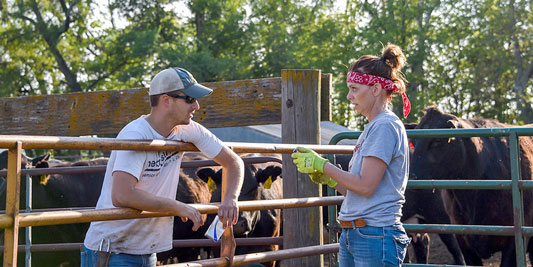
She remembers farmers who commonly dealt with the stress by drinking alcohol and by isolating themselves "because folks would start asking them about farming and it was both emotionally painful and humiliating…They didn't want to talk about how stressful it was for them."
While many of the stressors and coping mechanisms remain, Emanuel has seen some positive changes in how today's farmers respond to stress compared to the 1980s crisis. She said her adult sons are good at "advocating for themselves" when they need to take a day off or spend more time with their spouses and children.
For example, the other day, instead of staying at the farm shop and having a beer at the end of the day, the sons "decided to go home because they wanted to see their children before bedtime and to get a good night's rest," Emanuel said. She also said that younger farmers tend to recognize the importance of a work/life balance, hobbies, and time with friends, compared to older farmers.
Emanuel is the Community Health Director at the AgriSafe Network, a nonprofit organization that helps healthcare professionals improve their care for people in the agriculture community.
In addition to the healthy behaviors she sees in her sons, she has seen an increase in agriculture publications and conferences calling for articles and presentations about mental health.
She is also seeing "a definite push to reduce stigma coming from ag influencers themselves." These well-known farmers and ranchers share their viewpoints through a variety of ag-focused media, including podcasts, blogs, and magazine articles. They have significant potential to reach other producers since they're speaking from lived experience and tend to avoid more academic-sounding language.
"I'd like to call it hopeful forecasting," Emanuel said. "I think the tide is changing."
Hopeful Findings in Stressful Times
Like in the 1980s, today's farmers are dealing with increased stress, risk of suicide, and other mental health concerns. However, experts who work with farmers and farmworkers are seeing increased interest in mental health programming and decreased stigma around mental health, which may make it easier for healthcare providers to provide the care that farmers need.
Along with anecdotes like Emanuel's, some surveys are showing a decrease in stigma among farmers. A December 2021 publication from the American Farm Bureau Federation and Morning Consult compared survey results from April 2019, December 2020, and December 2021. The publication reported an 11% decrease in farmers and farmworkers who saw stigma as a barrier to seeking mental health treatment, from 72% of those surveyed in December 2020 to 61% in December 2021. While that decrease is a good sign, that still means that a majority of farmers and farmworkers see stigma as a barrier.
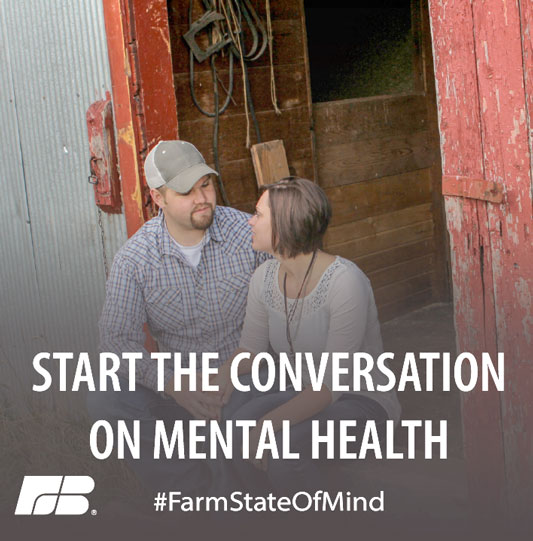
In addition to decreased stigma, this same publication found an increased awareness and use of mental health resources. It reported that 92% of the farmers and farmworkers surveyed said that they would feel comfortable talking about solutions with a loved one struggling with mental health, a 22% increase from April 2019. In addition, 53% of farmers and farmworkers said they were more aware of mental health and stress resources than they were a year ago. In December 2021, 41% of farmers and farmworkers said they have sought care from a mental health professional, compared to 25% in April 2019.
Increased Interest in Mental Health Programming
AgWell serves Colorado, New Mexico, and Wyoming, which make up the Rocky Mountain Farmers Union states. AgWell, part of a USDA-funded grant called the Western Region Agricultural Stress Assistance Program and supported by The Colorado Trust, provides workshops and classes around different topics including well-being and stress management. Its website also provides links to different mental health, financial, medical/injury, and other resources in its service area.
We also got positive feedback that these types of conversations never would've happened 20 years ago.
AgWell program director Clinton Wilson has witnessed an increased interest in conferences and trainings around mental health. In 2022, he co-facilitated two Weekend Wellness Retreats for Farmers and Ranchers in Washington state. The farmers in attendance shared that mental health was a common struggle for many of them as well as their peers. Farmers and ranchers said they wanted more trainings, workshops, and other opportunities to talk openly about their health and stress.
"We also got positive feedback that these types of conversations never would've happened 20 years ago," Wilson said.

Jessica Cabrera, Managing Director of Member Engagement at the American Farm Bureau Federation (AFBF), reported a shift in stigma with the farmers and ranchers she works with. "We used to not be able to get even a handful of farmers to sit in a room to talk about stress, anxiety, or mental well-being at a meeting, conference, or convention," she said. "Now, we are seeing farmers fill the room when we host sessions on this topic. At our most recent national leadership conference, we hosted 3 sessions related to mental health and wellness and all of them were well attended, sometimes standing room only."
AFBF, a grassroots nonprofit and a national advocate for farmers and ranchers, has 2,800 county Farm Bureaus in the United States as well as a state Farm Bureau in every state and Puerto Rico.
Peer-to-Peer Conversations
"'Mental health' are two words that used to be scary words that now have become more normalized," Cabrera said. "And normalizing the topic and having farmers personally testify to their own life experiences is really giving power to the conversation, and it's engaging more people."
'Mental health' are two words that used to be scary words that now have become more normalized. And normalizing the topic and having farmers personally testify to their own life experiences is really giving power to the conversation, and it's engaging more people.
Dakotah McGinlay, AgWell program assistant, said she heard from a farmer who was struggling with suicidal thoughts last year and partly credited AgWell's constant presence at different conferences and conventions for helping them through that difficult period, along with other available resources for farmers and ranchers.
McGinlay said that AgWell's presence helps farmers "feel seen" and "know that people understand and are out there trying to support them."
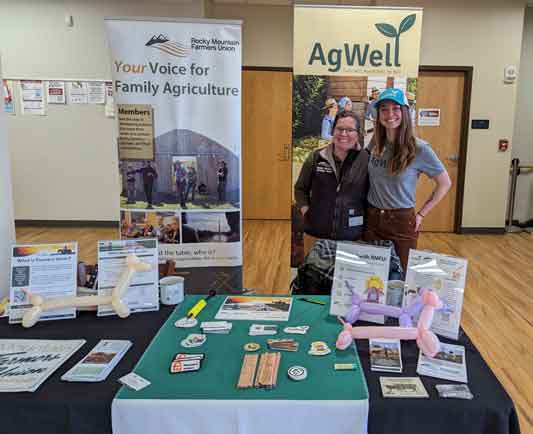
As important as therapy is, McGinlay said that there is also power in farmers and ranchers sharing their experiences with peers. "I think it's a really accessible way for them to start having those conversations and start breaking down that stigma," she said.
She remembers a farmer who was dealing with pain from an injury and was having trouble seeing beyond that pain. McGinlay does not know what specifically helped this farmer make it through that difficult period in her life, but she knows that this farmer felt comfortable and safe enough to share her experience with McGinlay.
"Given my past year with AgWell, I've seen a shift in people's willingness to open up about certain things," McGinlay said. "I've felt like they do trust me to some extent in this role with that very vulnerable information."
McGinlay also knows at least five farmers and ranchers in her community who have accessed the free therapy provided by the Colorado Agricultural Addiction and Mental Health Program (CAAMHP). CAAMHP provides six free therapy sessions from a licensed behavioral health professional who's familiar with agriculture communities. "They are sharing their experience with some people, especially if they've had a really good experience. They really want to let other people know about it and hopefully help others through the CAAMHP resource," McGinlay said.
Building Trust with Farmers
McGinlay said that one CAAMHP counselor in particular has a direct way that she approaches mental health topics. McGinlay believes this direct approach is appreciated in the agriculture community, "when time is of the essence and you want to see results as quickly as possible."
McGinlay's work also shows the importance of building trust and relationships with farmers and ranchers. She hosts weekly events called Coffee and Conversations. One farmer didn't share much about himself for the first 6-8 months of McGinlay's job. Then, one day, "he actually said that he was going to sit with me and go turn his truck off," McGinlay said. "He was just planning on grabbing a quick coffee and getting back to work. But because I was there, he felt like he could take a moment to slow down and reset before continuing his day."
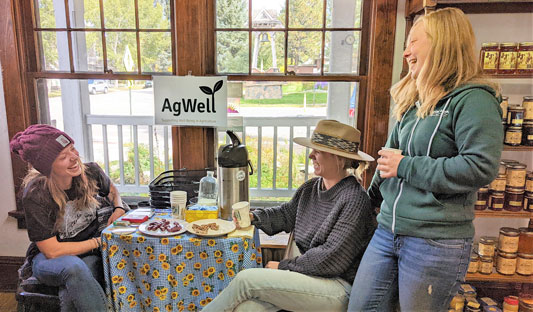
Wilson echoed McGinlay's thoughts on building trust: "In order to gain street cred with farmers and ranchers, most of the time you need to be a farmer or rancher or you need to be somebody in the community that has shown that you're there and that you understand what's going on."
You can provide all kinds of resources, but unless the farmer, rancher, or agriculture worker knows and trusts you, they are often very reluctant to talk with you.
"You can provide all kinds of resources," Wilson said, "but unless the farmer, rancher, or agriculture worker knows and trusts you, they are often very reluctant to talk with you."
Cabrera stressed the importance of training farm service providers — such as lenders, crop scientists, Extension agents, or crop insurance adjusters — in how to identify stress and talk with farmers and ranchers. Not only do these farm service providers get a "behind-the-scenes look," Cabrera said, but they also experience stress and anxiety when delivering bad news to farmers and need their own coping strategies.
Resources for Healthcare and Organizations Working with Farmers
FarmResponse is a 3.5-hour training for healthcare professionals. Over 800 individuals in 38 states have completed this training. Topics include suicide and substance use, agriculture community values and subpopulations, and healthcare challenges.
Rural Resilience training teaches participants about stress management, active listening, as well as effective communication strategies to use with agriculture communities. This training was developed by AFBF, Farm Credit, and National Farmers Union, and its content was created by Extension professionals at Michigan State University, Montana State University, South Dakota State University, University of Illinois, and University of Wisconsin.
The National Institute of Food and Agriculture's Farm and Ranch Stress Assistance Network (FRSAN) program provides grants to organizations looking to improve farmers' mental health and reduce suicides.
Challenges and Possibilities Ahead
McGinlay has noticed that, despite some progress in reducing stigma about mental health, she hasn't had many farmers or ranchers approach her to talk about substance use. In addition, she said that suicide and access to lethal means are not talked about much or directly.
"I would love more tools in how to have those conversations. And I know there are resources out there to have conversations around lethal means in ag communities or addiction support," McGinlay said. "But what I don't think I see a lot of is super approachable ways that are almost casual."
Another concern she's heard among farmers and ranchers is that the conversations around mental health are helpful, but they also want more information about financial planning support, succession planning support, and other tools to help them address the root causes of their stress.
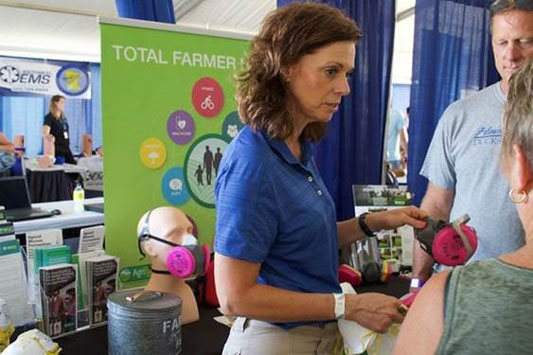
Wilson said that the younger generation of farmers seems more willing than older generations to talk about mental health and to ask for help. AgWell, he said, is looking for ways to encourage older and retired farmers to mentor and provide support for younger and new farmers. Wilson also wants to help create farmer and rancher peer networks to make it easier for these groups to provide and receive support from one another.
Emanuel said her sons ask their father and grandfather what it was like to farm during the 1980s crisis, especially without the safety-net programs that are available now because of that crisis. She said that older farmers are "very willing to share the stories and to talk about it because they want to see that next generation succeed."
Cabrera echoed these thoughts on the value of older farmers' experiences, especially for first-generation farmers. First-generation farmers don't have older family members who farmed and therefore taught them how to go through different challenges like natural disasters or economic crises. In addition, these first-generation farmers may not have friends who farm and the friends they do have may not understand what they're going through. It's important to connect these farmers with more experienced farmers and with those who understand the agricultural life.
"The more we normalize this conversation among farmers and ranchers," Cabrera said, "the more we will continue to see this shift in awareness, reduction in stigma, and willingness to engage."
Resources for Farmers, Ranchers, and Farmworkers
The AgriStress Helpline for the agriculture community (833.897.2474) is currently available in Connecticut, Missouri, Pennsylvania, Texas, Virginia, and Wyoming. The AgriStress Helpline is available 24/7 by phone and text and is able to serve callers in a broad range of languages. Crisis specialists are trained to understand the stressors of agriculture; learn about state-specific agriculture; and provide callers local, state, and federal resources. In addition, they communicate common concerns they're hearing from callers to their state department of agriculture so that the department is aware of larger issues, such as workforce shortages.
Farm State of Mind works to reduce stigma and increase access to mental health information and resources. Its website has a directory that lists available resources in every state and Puerto Rico.
The Total Farmer Health Coach program has healthcare providers, especially nurses and behavioral health specialists who live and work in rural areas, to provide AgriSafe outreach training and resources to agriculture communities.
QPR for Farmers and Farm Families is a 1.5-hour training for producers and agricultural business employees to learn how to identify mental health crises and respond appropriately.

